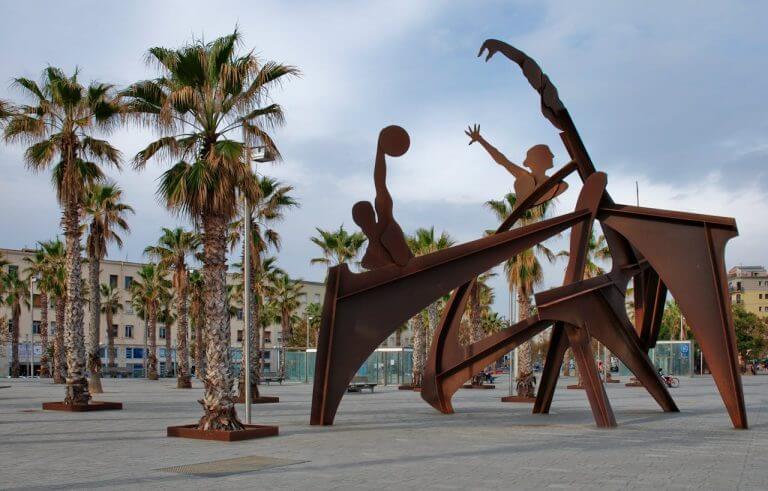Are you looking for a fun and creative way to improve your English skills? Look no further than the world of art! Art has long been recognized as an effective tool for enhancing language development, and it’s not just limited to visual arts.
From music to theater, poetry to film, there are countless ways in which artistic expression can help you become a better communicator.
So why is art such a powerful medium for improving language skills? For one thing, it engages multiple senses and taps into our emotions, making it more memorable and meaningful than traditional textbook learning.
Additionally, creating or experiencing art requires critical thinking and problem-solving skills, which are essential components of language acquisition.
Whether you’re painting a landscape or analyzing the themes of a novel, engaging with art helps develop vocabulary, grammar, and syntax in a natural and immersive way.
So let’s explore some specific ways that incorporating art into your language practice can take your English skills to the next level!
Table of Contents
Music And Language Learning
As a creative writing education specialist, I have seen first-hand the power of music in language learning. Music has the ability to make language more memorable and enjoyable for learners. By listening to songs with English lyrics, students can practice their comprehension skills while also getting exposure to new vocabulary words and idiomatic expressions.
One effective exercise is lyrics interpretation. This involves analyzing the meaning behind the song’s lyrics and discussing them as a group or individually. This allows students to not only improve their reading and listening skills but also encourages critical thinking and cultural understanding.
Another useful activity is songwriting exercises where students write their own lyrics based on prompts provided by the teacher. This helps develop creativity, grammar skills, and an understanding of poetic devices such as rhyme scheme and metaphor.
Overall, incorporating music into language learning provides an engaging way for students to improve their English skills while also discovering new forms of artistry.
As we move on to explore theater and dialogue practice, it’s important to note that these activities are complementary to those involving music. While music focuses on enhancing comprehension through sound, theater emphasizes visual cues like body language and facial expressions which help reinforce communication skills essential in everyday conversations.
Let’s dive deeper into how theater can be used effectively in improving English proficiency!
Theater And Dialogue Practice
Music has long been a tool for language learning, but it’s not the only art form that can improve your English skills. Another great option is theater! Through improvisation exercises and role playing activities, you can practice dialogue in a fun and engaging way.
Improvisation exercises are a fantastic way to improve your ability to think on your feet and respond quickly in conversation. By practicing with others in an interactive setting, you’ll be able to develop your listening skills, build confidence when speaking, and learn how to express yourself more clearly.
Role playing activities are also very effective because they allow you to step into different characters and situations, which helps expand your vocabulary while improving pronunciation and intonation. With these tools at your fingertips, you’ll soon find yourself communicating with ease both on stage and off!
Now let’s move on to poetry and vocabulary expansion – another exciting path towards mastering the English language.
Poetry And Vocabulary Expansion
Poetry is an artistic expression that can help expand your vocabulary in a fun and creative way. Through reading, analyzing, and writing poetry, you can learn new words and phrases while also exploring the nuances of language.
One technique to enhance your vocabulary through poetry is word association. This involves associating a new word with something familiar or memorable to you, which helps embed it into your memory.
Another useful tool for expanding your idiomatic expressions through poetry is by paying attention to how poets use metaphors and similes. These literary devices are used to create comparisons between two seemingly unrelated things, allowing readers to better understand complex ideas or emotions using everyday language. By studying these techniques, you can gain insight into the meaning behind unfamiliar idioms and incorporate them into your own writing.
Watching films from different cultures is a great way to improve your understanding of other people’s perspectives while simultaneously developing your English skills. Not only will you be exposed to new vocabulary, but you’ll also get insights into cultural norms that may differ from those of your own culture.
When watching foreign films, it’s important to pay attention not just to what the characters are saying but also their actions and body language as this often conveys additional information. Additionally, analyzing film plots can provide opportunities for critical thinking exercises such as predicting outcomes or interpreting symbolism.
Incorporating film analysis into your English learning routine can make it more engaging while helping you develop valuable communication skills across cultures.
Film And Cultural Understanding
As Emily Dickinson once wrote, “There is no Frigate like a Book.”
Poetry has the power to transport us to new worlds and expand our vocabulary.
But what if we could experience those same benefits through another form of art? That’s where international cinema comes in.
Watching foreign films can offer an opportunity for cross-cultural communication through film analysis.
By analyzing characters’ actions, motives, and cultural context, viewers gain a deeper understanding not only of the film itself but also of the culture it represents.
This type of analysis encourages critical thinking and empathy towards different perspectives.
Additionally, watching movies with subtitles allows viewers to improve their English language skills by reading along with dialogue spoken at natural speed.
Moving from poetry and vocabulary expansion to international cinema and cross-cultural communication may seem like a big leap, but both forms of art offer similar benefits when it comes to expanding knowledge and improving language skills.
So why not give foreign films a chance next time you’re looking for something to watch?
You never know what new world or perspective you might discover while sharpening your critical thinking abilities!
Art Analysis And Critical Thinking
Art analysis and critical thinking are important skills to develop in improving your English language proficiency.
Through analyzing visual media, you can learn how to express yourself more effectively through writing, speaking, and other forms of communication.
As an education specialist, I recommend incorporating collaborative projects into your art analysis sessions to enhance your learning experience.
To begin sharpening these skills, start by looking at a piece of artwork and asking yourself questions such as:
- What is the subject matter?
- What emotions does it evoke?
- How was it created?
By answering these questions using visual literacy techniques like color theory and composition analysis, you can gain insight into the artist’s intentions and create a deeper understanding of their message.
When working collaboratively on an art analysis project with others who speak different languages or come from different cultural backgrounds, this process becomes even more enriching.
Not only do you get exposure to different perspectives but also have opportunities to practice expressing ideas and opinions clearly in English while being respectful of others’ viewpoints.
Incorporating these critical thinking skills will not only improve your language fluency but also broaden your appreciation for the arts.
Frequently Asked Questions
How Can I Use Music To Improve My Speaking Skills In English?
Immerse yourself in the melodic rhythms of English songs and watch your speaking skills soar to new heights.
Music can be a powerful tool for language learning, as it allows you to absorb not only vocabulary and grammar, but also intonation, rhythm, and pronunciation.
By role playing exercises or analyzing song lyrics with fellow learners, you’ll find that music offers rich opportunities for practicing conversational English in an engaging and dynamic way.
So why settle for dull textbooks when you can sing along to catchy tunes and enhance your language abilities at the same time?
Let music guide you on a journey towards fluency!
How Can Theater Help Me To Improve My Listening Skills In English?
Role playing exercises and improvisation games are excellent tools for improving your listening skills in English. By participating in these activities, you will be able to practice processing information quickly while also developing your ability to understand different accents and language patterns.
As a creative writing education specialist, I encourage my students to take advantage of the many benefits that theater can offer when it comes to language learning. Through engaging with characters and storylines in real-time, learners can immerse themselves fully in the English language, picking up on new vocabulary and grammar structures without even realizing it!
So why not try out some role-playing or improv games today? You might just find that they’re one of the most effective ways to improve your listening skills in English.
Can Reading And Analyzing Poetry Help Me To Expand My Vocabulary In English?
Analyzing prose is like exploring a vast forest where every tree represents an idea waiting to be discovered.
By delving into poetry, you not only expand your vocabulary in English but also gain insight into the culture and history of the language.
The beauty of literature lies not only in what is written on the page but how it’s interpreted through idioms and metaphors unique to each writer.
Through analyzing poetry, you can learn new phrases that are often used colloquially, giving you an advantage in everyday conversations with native speakers.
So next time you pick up a poem, remember that by understanding its intricacies, you’re opening yourself up to a world of knowledge beyond just words on paper.
How Can Watching Films Improve My Understanding Of English Culture?
Exploring British Cinema and Analyzing American TV Shows are fantastic ways to improve your understanding of English culture.
By immersing yourself in the language as it is used in popular media, you will gain a deeper appreciation for not only the nuances of the language but also its cultural context.
It’s like being transported to another world where you can experience firsthand how people communicate with each other.
You’ll start to pick up on idioms and colloquialisms that might otherwise be lost on you.
Plus, watching movies or television shows is an enjoyable way to learn!
So grab some popcorn and get ready to dive into a new world of possibilities.
How Can Studying Art Improve My Critical Thinking Skills In English?
Imagine a blank canvas. It is empty, devoid of any color or expression. But as you begin to paint, the strokes and hues create something unique, reflective of your artistic expression.
Similarly, studying art can improve your critical thinking skills in English. By analyzing paintings, sculptures, or even graffiti, you develop an understanding of symbolism and metaphorical language that transcends beyond words. This skill enhances your ability to comprehend complex texts and aids in language acquisition by allowing you to decipher meaning through visual cues.
Artistic expression fosters creativity which expands your vocabulary and makes writing more engaging for readers. So pick up a brush or visit a gallery because learning about art may just be the catalyst for improving your English skills!
Conclusion
As a creative writing education specialist, I firmly believe in the power of art to improve English skills.
Through music, theater, poetry, film and art itself you can enhance your language abilities in different ways.
Listening to English songs with their lyrics on hand is an excellent way to practice pronunciation and intonation.
Going to see plays or movies without subtitles will force you to focus on listening comprehension.
Poetry analysis can expand your vocabulary while also teaching you literary techniques that are essential for critical thinking.
Watching films provides insight into cultural references that can help contextualize the language you’re learning.
And finally, studying art helps develop analytical skills necessary for understanding complex texts and expressing ideas clearly.
So don’t limit yourself to textbooks and grammar exercises!
Let your creativity run wild by incorporating art into your English studies.
You’ll be surprised at how much it can help you improve your language skills – not just passively consuming art but actively engaging with it as a means of improving communication in one of the world’s most widely spoken languages.








